Defending Robert Gibbs From Inside the White House Press Corps
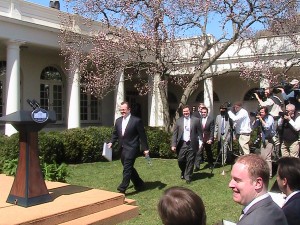 I’ve been reading a lot about White House Press Secretary Robert Gibbs recently. The Washington Post did a lengthy profile on him, from which the Huffington Post gleaned a list of the 6 biggest press corps complaints about Gibbs. There are some fair criticisms, some of which have been echoed on the record by White House reporters here at Mediaite. Much of the criticism of Gibbs is simply built into the divergent roles of Press Secretary and reporter.
I’ve been reading a lot about White House Press Secretary Robert Gibbs recently. The Washington Post did a lengthy profile on him, from which the Huffington Post gleaned a list of the 6 biggest press corps complaints about Gibbs. There are some fair criticisms, some of which have been echoed on the record by White House reporters here at Mediaite. Much of the criticism of Gibbs is simply built into the divergent roles of Press Secretary and reporter.
Watching yesterday’s briefing, however, I was reminded of one of the chief reasons I like Gibbs. He’s a funny guy. But more than that, there’s a part of his job that gets completely lost in the media bubble, one at which he excels.
Before I get to those assessments of Gibbs, check out this clip from yesterday’s briefing. Any dope can toss out the occasional one-liner, but it takes special talent to inject this kind of situational humor into the butter-knife-dull setting of a press briefing:
Gibbs has become famous (or infamous, depending on your point of view) for his sense of humor, a trait that shouldn’t be so easily dismissed. The press corps, as David Shuster pointed out, plays at least an equal role in making press briefings a mostly tedious affair. We spend a lot of time asking the same question in new and novel ways, and Gibbs adroitly sidesteps them.
While Gibbs’ quips don’t always endear him to their targets, they keep the briefings interesting, and sometimes punctuate an important point.
That brings me to the talent that is often overlooked by Gibbs’ critics, his ability to reset the often skewed horizon on which the Obama-era political press frequently operates. It’s appropriate that on Tax Day, the day the Tea Party movement celebrates its 4th of July and Christmas rolled up in one, we find an excellent example of this in the rant that put them on the map. It was last February that CNBC’s Rick Santelli first galvanized these “patriots” around hostility toward “loser” homeowners, to an approving chorus of stock traders:
The rant gained instant traction, promoted heavily by Matt Drudge, and the media took to it like flies to honey. It was like backwards day, where the people who led this country to the verge of a new Great Depression cheered on a guy who pointed the finger at the victims of their own recklessness.
When Gibbs was asked about it the next day, he provided a clear, factual rebuttal to Santelli’s nonsense, and finished with a great laugh line.
Of course, the media focused on the back-and-forth rather than the substance of this “debate,” as Santelli somehow found a threat embedded in Gibbs’ response. I think this is the key area in which I diverge from other White House reporters on Gibbs. Many of his barbs are rooted in media criticism, which is much more resonant to me than to my colleagues. What looks like evasion to them (often, it is evasion) can sometimes be an entirely fair re-framing of an issue in more grounded terms. Simply put, sometimes spin happens to also be the truth.
For example, a few weeks ago, Gibbs was inundated with questions about whether the President supported the use of “Deem and Pass” in the House. Gibbs could have simply said “We don’t care how it gets here, just get the bill to the President if you can.” That is essentially what his responses amounted to.
Instead, he pointed out that the media-glommed “Demon Pass” meme was nothing more than a last-minute distraction by opponents of health care, that the Senate bill had passed with a supermajority, and that if and when it passed, it would be clear where everyone stood.
At his best, Gibbs excels at this, dropping rote talking points in favor of extemporaneous engagement. As Chip Reid pointed out, he is much more of an insider than most press secretaries, and this enables him to paint a much more vivid picture when he wants to. It also leads to incredulity when he claims not to know something.
As for the rest of HuffPo’s list, here goes:
Tough to Reach – It is true that Obama spokespeople can be impossible to get on the phone, much more so now than during the campaign. We would all like more access, but as a guy with a little over 2 years of journalism experience, I don’t have much to complain about on that score. The fact that the ratio of access is proportional to a journalist’s reach is nothing new, and while I’ve only covered this White House, I found the same phenomenon while covering the Clinton and McCain campaigns. In a perfect world, we’d all get an equal number of bites at the apple, a fact that even the front row crew acknowledges.
He’s Repetitive – Gibbs is also not alone in festooning his responses with extra verbiage, which does drive reporters nuts, but which all press representatives use when they need to run out the clock. If you’re a resident of the front row, though, it’s easy enough to cut in and try to regain focus with a follow-up.
I’ll Get Back to You – He’s also not the only one to take refuge in the “I’ll get back to you” escape pod. If I had a nickel for every time this was used on me by press flacks, I could finance the next stimulus.
Uses His Son as a Prop – I can see why the “Ethan Card” rankles, as I’ve had it used on me. Usually, this is Gibbs’ way of critiquing the media’s focus as childish, as he did when questions were raised about the use of the White House bowling alley. Truthfully, I feared for Gibbs’ safety when he deployed the comparison on April Ryan. It’s hit-or-miss, but it’s not something he does often, and I’m sure Ethan gets a kick out of it.
Ducking the Press Pool – This isn’t really Gibbs’ fault, but it does touch on a larger problem with the administration’s attitude toward the press.
As the leader of the Obama press apparatus, Gibbs does bear some responsibility for the valid criticism that this White House over-manages the press. The vast majority of the President’s activities are closed to the press, even a meeting with LPGA players, and when we do get to cover an event, it’s usually from a sheep-like enclosure from which we may not venture. I would love to be able to interview members of the audience at a bill signing, for example, but with the restrictions we work under, we’re often just as well off if we skip the event and watch it on C-Span. I hope that in private, Robert Gibbs goes to bat for us in trying to expand this kind of access, even if it’s only in recognition of the press as a necessary evil.
I would also point out to Gibbs that the shallowness he sees in today’s political reporting is much more a function of TV news producers ignoring our best work in favor of sizzling skillets of “He said what?”
White House briefing junkies (they exist!) will tell you that there are heaps of substance that never make it out of the briefing room and onto the cable air.
Didn’t Tell Reporters When Justice Stevens’ Retirement Broke – Really? A reporter complained that Gibbs didn’t break news to them? That sounds like a Yakov Smirnoff bit.
He probably should have taken some questions, I suppose, but I’m not sure what the news value would have been, since his responses would likely have consisted of “I’ll get back to you on that.”
If speculation that Robert Gibbs may soon move off of that podium and into a more senior role turns out to be true, and with all due respect to Bill Burton, I am sure as hell going to miss moments like this:
This is an opinion piece. The views expressed in this article are those of just the author.
New: The Mediaite One-Sheet "Newsletter of Newsletters"
Your daily summary and analysis of what the many, many media newsletters are saying and reporting. Subscribe now!
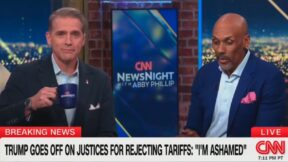
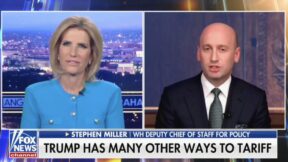

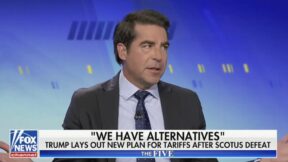
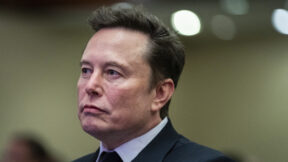

Comments
↓ Scroll down for comments ↓